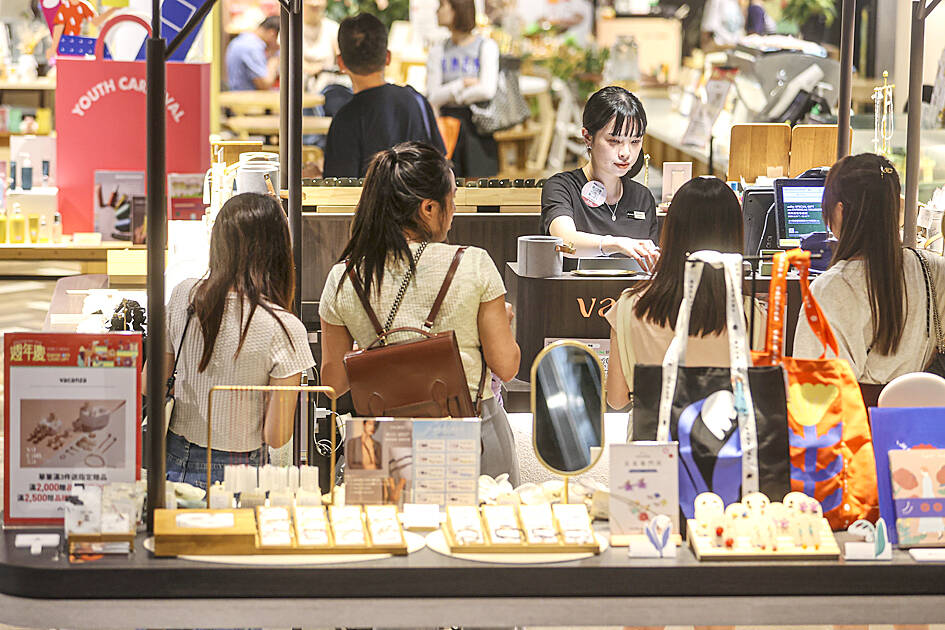The government’s business climate monitor last month flashed “red,” a quick return to a booming state after cooling a bit in July, as local firms benefited from inventory buildup ahead of new technology product launches, the National Development Council (NDC) said yesterday.
The latest composite score gained 4 points to 39, the best performance in 34 months, as the high sales season for technology products is approaching and demand for artificial intelligence (AI) has remained strong, NDC Economic Department Director Chiu Chiu-ying (邱秋瑩) said.
The uptick is expected to be sustained moving forward, she said.

Photo: CNA
The council uses a five-color spectrum to depict the nation’s economic state with “red” indicating a boom, “green” suggesting steady growth and “blue” signifying a recession. Dual-colors mean the economy is shifting gears to a better or worse state.
The boom came after key economic gauges such as exports, industrial production and overtime gained vigor, the council said.
Taiwan is home to the world’s largest suppliers of electronics used in smartphones, notebook computers, wearables, cars and cloud-based data centers.
Scores of local firms are responsible for making Nvidia’s AI chips, servers and other devices, while many others supply critical components for Apple Inc’s iPhone series, Apple watches and notebook computers.
Their business tends to pick up ahead of the Christmas season.
The index of leading indicators, which aims to project the economic landscape in the next six months, increased 0.43 percent month-on-month to 104.09, the council said.
The sub-indices on imports of semiconductor equipment, new construction floor spaces and local share prices posted upward cyclical movements, it said.
However, readings on business confidence, labor accession rates and money supply gave up some points, it observed.
Better order visibility led local semiconductor firms to increase their purchases of capital equipment from abroad to upgrade their technologies and expand capacity, Chiu said.
The trend would shore up private investment, a critical component of GDP, the official said.
The index of coincident indicators, which reflects the current economic situation, climbed 1.23 percent to 106.47, as seen in advances in electricity use, imports of machinery equipment, overtime hours, as well as revenues for retailers, wholesale operators and restaurants, it said.
Looking ahead, AI applications and high-performance computing are expected to grow more popular, bringing more business opportunities for local firms, who command global leadership positions in terms of technology processes, Chiu said.
That said, Taiwan still needs to watch out for uncertainty linked to the US presidential election in November, trade disputes between major economies and rising geopolitical tensions in the Middle East, the official said.

A wave of stop-loss selling and panic selling hit Taiwan's stock market at its opening today, with the weighted index plunging 2,086 points — a drop of more than 9.7 percent — marking the largest intraday point and percentage loss on record. The index bottomed out at 19,212.02, while futures were locked limit-down, with more than 1,000 stocks hitting their daily drop limit. Three heavyweight stocks — Taiwan Semiconductor Manufacturing Co (TSMC, 台積電), Hon Hai Precision Industry Co (Foxconn, 鴻海精密) and MediaTek (聯發科) — hit their limit-down prices as soon as the market opened, falling to NT$848 (US$25.54), NT$138.5 and NT$1,295 respectively. TSMC's

SELL-OFF: Investors expect tariff-driven volatility as the local boarse reopens today, while analysts say government support and solid fundamentals would steady sentiment Local investors are bracing for a sharp market downturn today as the nation’s financial markets resume trading following a two-day closure for national holidays before the weekend, with sentiment rattled by US President Donald Trump’s sweeping tariff announcement. Trump’s unveiling of new “reciprocal tariffs” on Wednesday triggered a sell-off in global markets, with the FTSE Taiwan Index Futures — a benchmark for Taiwanese equities traded in Singapore — tumbling 9.2 percent over the past two sessions. Meanwhile, the American depositary receipts (ADRs) of Taiwan Semiconductor Manufacturing Co (TSMC, 台積電), the most heavily weighted stock on the TAIEX, plunged 13.8 percent in

In a small town in Paraguay, a showdown is brewing between traditional producers of yerba mate, a bitter herbal tea popular across South America, and miners of a shinier treasure: gold. A rush for the precious metal is pitting mate growers and indigenous groups against the expanding operations of small-scale miners who, until recently, were their neighbors, not nemeses. “They [the miners] have destroyed everything... The canals, springs, swamps,” said Vidal Britez, president of the Yerba Mate Producers’ Association of the town of Paso Yobai, about 210km east of capital Asuncion. “You can see the pollution from the dead fish.

ASML Holding NV, the sole producer of the most advanced machines used in semiconductor manufacturing, said geopolitical tensions are harming innovation a day after US President Donald Trump levied massive tariffs that promise to disrupt trade flows across the entire world. “Our industry has been built basically on the ability of people to work together, to innovate together,” ASML chief executive officer Christophe Fouquet said in a recorded message at a Thursday industry event in the Netherlands. Export controls and increasing geopolitical tensions challenge that collaboration, he said, without specifically addressing the new US tariffs. Tech executives in the EU, which is